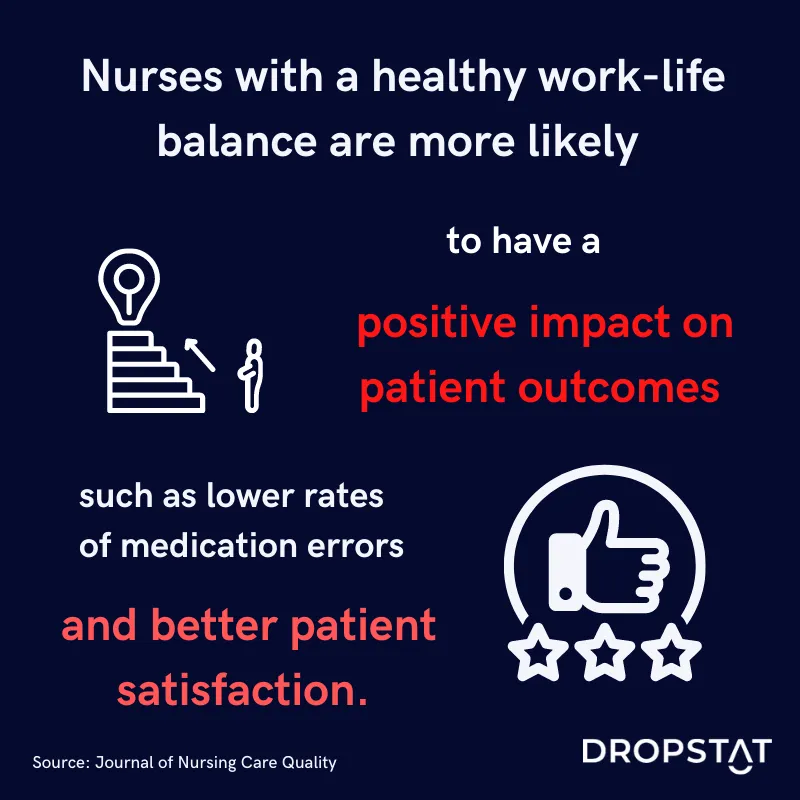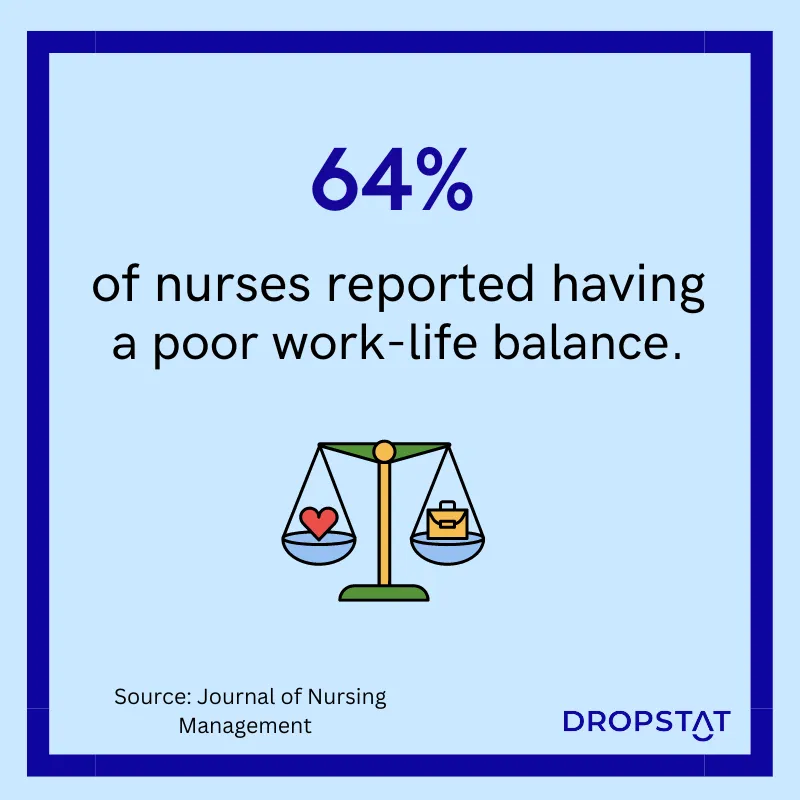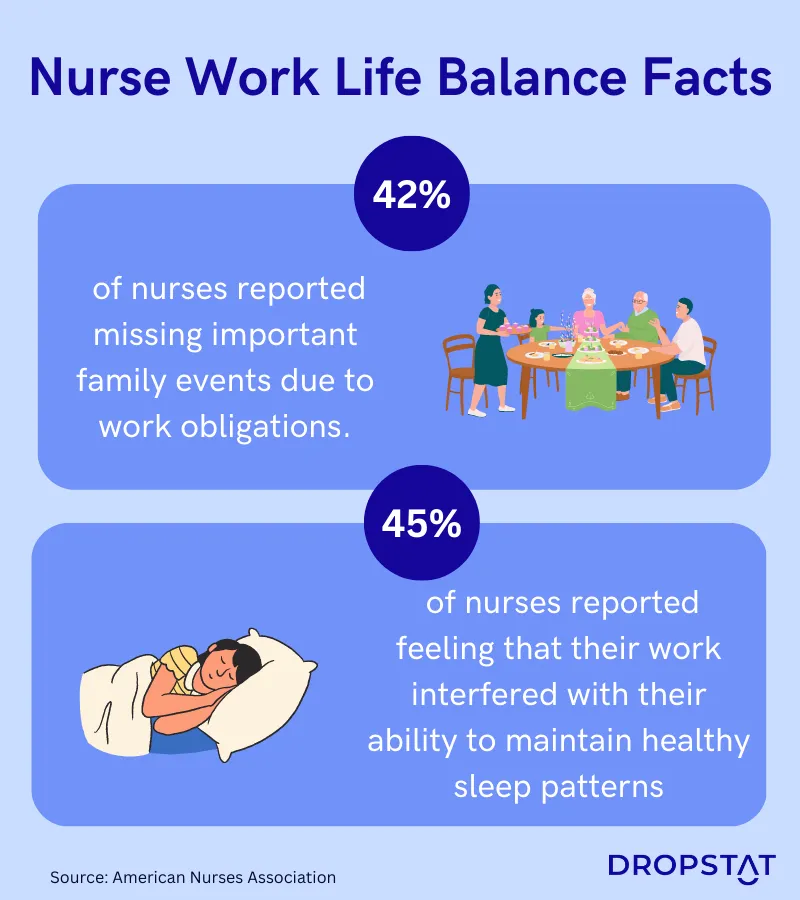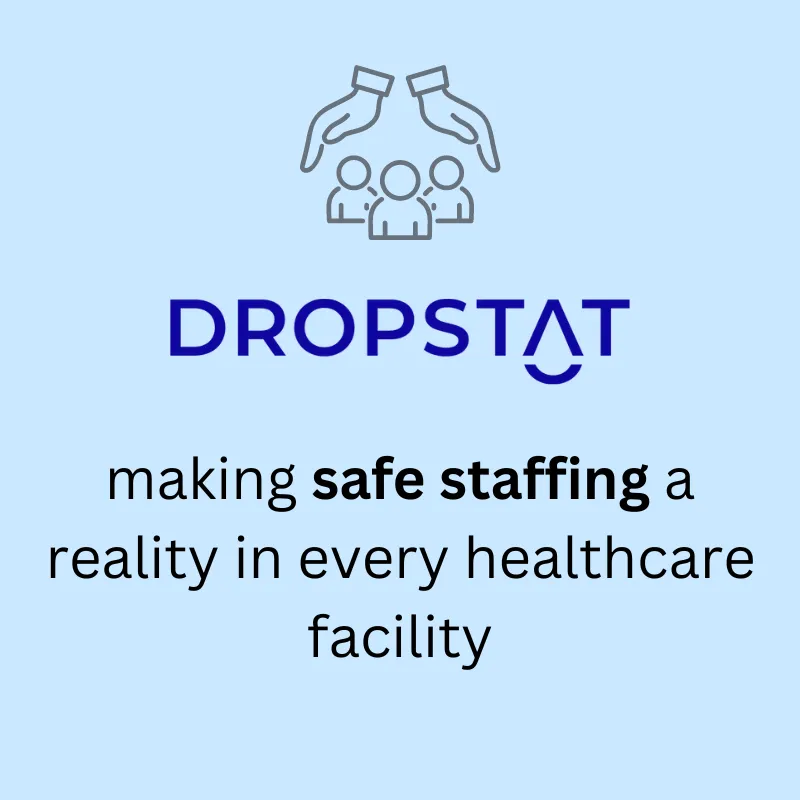Dropstat explores the importance of work-life balance for nurses, barriers to achieving work-life balance in hospital settings, and practical strategies your facility can implement to help promote work-life balance among your nursing staff.
What is a nursing work-life balance?
A nursing work-life balance refers to the ability of nurses to successfully manage the demands of their job while also maintaining a healthy personal life. It involves finding a balance between the time and energy required to provide quality patient care and to engage in activities outside of work that promote personal well-being. This includes spending time with family and friends, pursuing hobbies, and engaging in physical activity.
The importance of a healthy work-life balance in nursing
Maintaining a work-life balance is crucial for nurses to recharge, rest, and rejuvenate for the health and well-being of nurses and for the success of your facility. Some of the major benefits of improving work-life balance in nursing include:
Reduced burnout and turnover
Healthcare workers are at risk of experiencing burnout due to the demanding and stressful nature of their work. Burnout can lead to physical and emotional exhaustion and reduced job satisfaction. Achieving work-life balance can help prevent burnout and turnover by providing time for rest, relaxation, and self-care.
Increased engagement and productivity
Nurses who have a good work-life balance are more engaged and motivated in their work. They are more likely to have energy and focus on performing their duties effectively. This can increase productivity, benefiting patient care and the facility’s bottom line.
Improved patient outcomes
Nurses with an excellent work-life balance are less likely to experience stress and fatigue, leading to fewer errors and better patient outcomes. They can also provide more personalized and compassionate care when they are emotionally and physically rested.

Improved mental and physical well being
Nurses who are overworked and stressed may neglect their physical and mental well-being, leading to a higher risk of chronic diseases such as heart disease, diabetes, and obesity and mental health issues such as anxiety and depression. By maintaining a healthy work-life balance, nurses can prioritize exercise, healthy eating, and other self-care activities that promote a healthy lifestyle.
Better recruitment and retention
Healthcare facilities prioritizing work-life balance for their nurses can attract and retain high-quality staff. This can enhance the facility’s reputation and increase patient satisfaction.
What factors prevent nurse work-life balance?
A nursing career is one of the most demanding jobs, making it very difficult to balance personal and professional lives. Here are some of the main factors that contribute to this:
- Long and demanding work hours: Hospital nurses often work long and irregular hours, including night shifts, weekends, and holidays, which can interfere with their personal life and reduce their time for self-care and family activities.
- High workload and staffing shortages: Nurses often have to work with limited resources, including staffing shortages, which can increase their workload and stress levels, leading to burnout and reduced work-life balance.
- High-stress environment: Nurses work in a high-stress environment, dealing with critically ill patients, end-of-life care, emergencies, and high-pressure situations, which can affect their physical and mental health and interfere with their personal life.
- Lack of support from management: Nurses may not receive adequate support from their supervisors and management for taking time off for a vacation or to rest, or for family time. When work pressures cause nurses to miss social events, nurses may feel a sense of isolation and lack of recognition for their hard work.
- Lack of flexibility in scheduling: Nurses lack access to flexible scheduling options, such as part-time or job-sharing positions, making balancing work and personal responsibilities challenging.

7 ways your facility can promote the work-life balance of your nurses:
Here are 7 effective strategies your management team can start implementing today to improve the work-life balance of your nurses and achieve the best patient outcomes:
- Implement flexible scheduling
Flexible scheduling, such as part-time or job-sharing positions. By providing more options for scheduling, nurses can have greater control over their work schedules, allowing them to manage their personal lives and responsibilities better.
2. Provide adequate staffing
Ensuring adequate staffing levels with nurse scheduling software can help improve patient outcomes and significantly reduce nurses’ workload and stress levels, leading to better work-life balance.
3. Avoid nurse overtime
Overtime can disrupt a nurse’s personal life, making spending time with family and friends or engaging in hobbies and other activities difficult. Working overtime also leads to increased stress, fatigue, and burnout. To promote a healthy work-life balance, employers need to recognize the harmful effects of overtime and hire additional staff to fill in gaps to prevent nurses from burning out.
4. Offer Paid Time Off (PTO)
Providing generous PTO benefits can allow nurses to take time off for vacation, illness, or personal reasons, promoting work-life balance and preventing burnout.
5. Encourage self-care:
Encouraging and promoting self-care activities like exercise, meditation, or mindfulness training can help nurses manage stress and improve their overall well-being.

6. Foster a positive work environment:
Creating a positive work environment, including supportive management, teamwork, and recognition programs, can improve job satisfaction and promote nurses’ work-life balance.
7. Emphasize work-life balance in organizational culture:
Promoting work-life balance as an essential aspect of organizational culture can signal nurses that their well-being is a priority, leading to better nurse satisfaction and retention.
How Dropstat prioritizes a healthy work-life balance for nurses
Dropstat is an advanced AI scheduling app that integrates your nurses’ work preferences into the scheduling system. This helps your schedulers and managers schedule shifts that align with your nurses’ preferences and helps your nurses effectively manage their personal and professional lives without compromising on family time, social activities, and adequate rest.
Dropstat also allows schedulers to plan shifts up to 2 months in advance. This gives your nurses sufficient time and the peace of mind to plan their personal life, such as vacations and appointments, and manage a healthier work-life balance.
Schedule a demo now to find out how Dropstat can help your nurses maintain a healthier work-life balance and enjoy increased retention rates and productivity in your facility.







